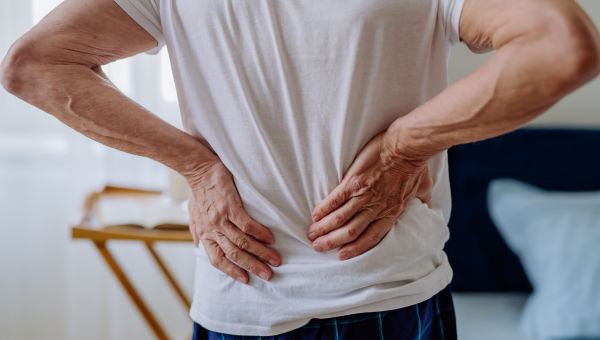9 cancer signs you shouldn't ignore
Subtle changes could signal something serious, like breast, colon, or lung cancer.
Updated on October 9, 2024

Cancer can cause a variety of symptoms depending on where it is located, how much it has spread, and whether it is located near organs and tissues. Symptoms may not be obvious, however, and some may be dangerously deceptive. Seemingly minor changes, like a nagging cough or persistent backache, can occasionally signal cancer. Too often, these aren’t taken seriously until the disease has become more advanced. So how can you distinguish between an innocent ache and a pain you should report to your healthcare provider (HCP)?
“I tell patients that if there are symptoms that are out of the ordinary or persistent or frequent in nature or extreme in intensity, they should seek attention from their primary provider,” says Elwyn Cabebe, MD, director of medical oncology at Good Samaritan Hospital in San Jose, California.
Signs and symptoms can vary widely, so don't hesitate to talk to your HCP about anything that seems out of the ordinary—especially if you notice any of these nine symptoms that can sometimes indicate cancer.

Unintended weight loss
Unexplained weight loss—10 pounds or more—can be the first sign of cancer, especially with cancers of the esophagus (the muscular tube that carries food from the mouth to the stomach), lung, or stomach, according to the American Cancer Society. The Cancer Treatment Centers of America estimates weight loss affects about 80 percent of people with esophageal and stomach cancers and nearly 60 percent of patients diagnosed with lung cancer.
Cancer can deprive healthy cells of the nutrients they need, regardless of what you're eating, which may in part explain why cancer can cause a decrease in weight. Decreased appetite can also result in reduced intake of food; this is particularly common during cancer treatment. Still, unexplained weight loss could be a sign of conditions other than cancer. If you're not actively trying to lose weight but have lost more than a few pounds, make an appointment with your HCP.

Change in bladder or bowel function
Acute (short-term) diarrhea is a common problem and is typically the result of a virus, bacteria, or food sensitivity. Most bouts will last a day or two before going away on their own. Likewise, constipation—which causes hard, dry stool, and fewer than three bowel movements in a week's time—is not often caused by a serious medical condition and can typically be improved with water, exercise, and fiber.
If these bowel changes—and others like narrowing of the stool (poop)—are long-lasting and don't go away on their own, they should be checked by your HCP. Bloody stool is another symptom you should report to your HCP. It's not always as obvious as you might think; stool may appear dark red or blackish in color.
These symptoms may indicate other digestive conditions, such as irritable bowel syndrome (IBS, a chronic condition that causes changes in bowel movements) and inflammatory bowel disease (IBD, chronic inflammation of the digestive tract), but they can also be signs of colon cancer.
Be aware of bladder changes, too, like pain when urinating, bloody urine, more frequent urination, or a weak stream. While these signs and symptoms are often caused by a urinary tract infection or an enlarged prostate (a male reproductive organ that makes semen), they may also indicate urinary tract or prostate cancer. If you have any of these symptoms, be sure to tell your HCP about it.

Fever
A fever is often the body's natural response to an infection or illness. Viral and bacterial infections, like the flu or strep throat, as well as some medications and autoimmune diseases (when the immune system mistakenly attacks your own cells), can cause an increase in body temperature.
Fevers rarely point to cancer, but they're common among people with cancer, especially if the disease affects the immune system. Leukemia (which affects the blood and bone marrow) and lymphoma (which affects white blood cells in the immune system) are two types of cancer that often result in a fever, but experts don’t know exactly why these and other cancers cause a rise in temperature. One explanation is that cancer cells trigger the immune system to react in this way. People with these types of cancers also get frequent infections, which can also cause fever.
Fevers may come and go over several days or weeks and can also cause night sweats (sweating heavily during sleep). If you have fevers that come and go or frequent infections along with fatigue and weight loss, see your HCP.

Persistent cough or hoarseness
During cold and flu season, a persistent cough may seem typical, but if you don’t have any of the accompanying symptoms (like sneezing, and runny or stuffy nose), get it checked out. If you've tried to treat the cough or hoarseness, but nothing seems to work, see your HCP. A persistent cough could be a sign of lung cancer, the leading cause of cancer deaths in the U.S. A cough that produces blood is another sign of lung cancer that should be checked by an HCP as soon as possible.
Hoarseness, or breathy, raspy, or strained sounds when talking can be a sign of cancer of the thyroid (a small gland in the neck that makes hormones that regulate metabolism) or the larynx (voice box). Voice changes that don't improve within two weeks, along with difficulty swallowing or pain in the neck or throat, should be evaluated by an HCP.

Unexplained aches and pains
Pain is usually your body's way of signaling a problem, but the cause of the issue isn't always clear. Maybe you overdid it playing basketball or strained a back muscle lifting a heavy box. But if the ache doesn't go away after attempting treatment, it might signal something more serious.
Persistent pain should be reported to an HCP, who can determine if you need further evaluation. Chronic pain could indicate:
- A brain tumor, which may be associated with headaches
- Cancers of the colon (large intestine), kidney, and ovaries (where eggs are stored and released during the menstrual cycle), which may cause lasting back pain
- Bone cancer, which can result in pain at rest or with activity
- Testicular cancer (which affects the testes, which make sperm), which is often accompanied by pain and swelling of the testicle

Unusual bleeding or bloody discharge
Blood or bloody discharge from anywhere in the body can be concerning, and might signal cancer, infection, inflammation, injury, or a number of causes that are not necessarily cancer. Bleeding is your body's way of getting your attention: Don't ignore it. See your HCP to get the proper evaluation and treatment.
Call your HCP at the first sight of blood:
- In stool, which could be a sign of cancer of the colon or rectum (last several inches of the large intestine)
- In urine, which can be a sign of bladder and kidney cancer
- From nipples, which can be a sign of breast cancer
- From coughing, which can be a sign of lung cancer
Unusual vaginal bleeding—blood or bloody discharge not related to your typical menstrual cycle—can also be a sign of cancer. People who are in menopause and have not had a period for 12 months in a row should see their HCP if they experience vaginal bleeding. Vaginal bleeding during menopause, in particular, can be a sign of cancer of the ovaries or cervix (the lower end of the uterus).

Fatigue
The causes of cancer-related fatigue can vary. Some cancers release cytokines, proteins thought to cause fatigue. Others weaken muscles and damage the liver, heart, kidneys, or lungs. Cancer can also cause changes in hormones, which may lead to fatigue. Colon and stomach cancers can also cause bleeding, which can lead to anemia (low levels of red blood cells) and exhaustion.
Cancer-related fatigue can cause:
- Low energy and weakness
- Heaviness in arms and legs
- Confusion
- Inability to complete everyday activities
- Sadness, depression, or irritability
If you’re experiencing any of these signs over a prolonged period, talk to your HCP.

Mouth and skin sores that won’t go away
Sores that appear in the mouth and won't go away can signify oral cancer. Mouth cancers can occur on the lips, tongue, gums, and other oral surfaces. Bleeding, loose teeth, and white or red patches are also signs. White patches can be caused by a condition known as leukoplakia, which can develop into oral cancer. People who smoke, chew tobacco, or drink alcohol in excess are at increased risk for oral cancer.
It’s also important to get sores and moles checked for skin cancer—the most common form of cancer in the U.S. Sores that bleed, ooze, won't go away, or heal but return could be signs of skin cancer.
If you notice any of these signs, see a general practitioner, dentist, or dermatologist.

Skin changes and lumps
Lumps in the chest area may signal breast cancer, but bumps and growths that may be signs of cancer can also appear in the testicles, lymph nodes, and other soft tissue like fat, ligaments, or nerves.
Become familiar with your body and note any changes to your breasts, testicles, and skin. Notify your HCP of changes to the color, size, or shape of warts, moles, or freckles; these may indicate skin cancer. There are other signs of breast cancer besides lumps, too, such as thick, red or discolored skin on the breast, dimpling of skin, or changes in size and shape. Discuss these changes with your HCP as soon as you can—don't wait for your next screening appointment.
Cancer can also cause other skin changes, like jaundice, or yellowing of the skin and eyes. The change in pigmentation could be the result of infections, as well as blood or liver diseases. It could also be caused by cancer of the pancreas (which makes substances that help with digestion) or cancer that's spread to the liver.

Get screened regularly
Cancer symptoms can be easy to overlook. In some cases, the disease can occur with no noticeable signs or ones that develop only when the cancer is in more advanced stages. This makes regular cancer screenings crucial.
"I think what's most important is to get all the cancer-appropriate screening tests," says Dr. Cabebe. These include screenings for:
- Breast cancer: Screening guidelines vary, but the ACS recommends annual mammograms (X-rays that can detect early breast cancer) for women of average risk between 45 and 54, with the option to start at 40. At 55, a woman can switch to screenings every two years or continue annual exams. Screenings should continue as long as someone is healthy and expected to live for the next 10 years or more. The U.S. Preventive Services Task Force (USPSTF) recommends that screening begin at age 40, with mammograms every other year until age 74. People should speak with their HCP to come up with the best screening timeline for their situation.
- Cervical cancer: According to the USPSTF, women between the ages of 21 and 65 should have a Pap test (which screens for cervical cancer) every three years. Women ages 30 to 65 have another option: a test for human papillomavirus (HPV, which increases the risk for cervical cancer), with or without the Pap test, every five years.
- Colorectal cancer: Everyone should be screened for colon cancer starting at age 45, according to the USPSTF and ACS. Both organizations recommend screenings until age 75, at which point you should speak with your HCP about future screenings. You may need to consider getting screened before age 45 if you have conditions like inflammatory bowel disease or a close relative with colorectal cancer.
- Lung cancer: The USPSTF recommends yearly lung cancer screenings for people between ages 55 and 80 who have smoked heavily in the past and still smoke or who quit within the last 15 years.
- Prostate cancer: Starting around age 40, men should speak with an HCP about the risk of prostate cancer and the benefits and drawbacks of screenings.
People at increased risk for specific diseases should speak with their HCP about personalized screening schedules. Cabebe also recommends quitting smoking, limiting alcohol intake, and maintaining a healthy weight—all of which help reduce your cancer risk. Even with precautions, cancer can still affect anyone. If you see or feel something unusual—even if you suspect it might be harmless—visit your HCP for an evaluation.

Siegel RL, Miller KD, Wagle NS, Jemal A. Cancer statistics, 2023. CA Cancer J Clin. 2023;73(1):17-48.
American Cancer Society. Signs and Symptoms of Cancer. Last revised November 6, 2020.
National Cancer Institute. Symptoms of Cancer. Updated May 16, 2019.
Cancer Treatment Centers of America. Cancer weight loss. Updated May 3, 2022.
Mayo Clinic. Cancer. December 7, 2022.
American Cancer Society. Loss of Appetite. Last revised February 1, 2020.
MedlinePlus. Diarrhea. Last updated July 20, 2016.
MedlinePlus. Constipation. Last updated July 28, 2016.
Centers for Disease Control and Prevention. Inflammatory bowel disease (IBD): What is inflammatory bowel disease (IBD)? Page last reviewed April 13, 2022.
American Cancer Society. Do I Have Colorectal Cancer? Signs, Symptoms and Work-Up. February 8, 2021.
American Cancer Society. Bladder Cancer Signs and Symptoms. Last revised January 30, 2019.
Centers for Disease Control and Prevention. Prostate Cancer: What Are the Symptoms of Prostate Cancer? Page last reviewed August 25, 2022.
Mayo Clinic. Urinary Tract Infection. September 14, 2022.
MedlinePlus. Fever. Last updated December 15, 2016.
Centers for Disease Control and Prevention. Influenza (Flu): Flu Symptoms & Complications. Last reviewed October 3, 2022.
Mayo Clinic. Strep throat. November 30, 2022.
Mayo Clinic. Leukemia. September 21, 2022.
American Cancer Society. Signs and Symptoms of Non-Hodgkins Lymphoma. Last revised August 1, 2018.
Mayo Clinic. Fever. May 7, 2022.
MedlinePlus. Lung Cancer. Last updated June 19, 2021.
Cleveland Clinic. Hoarseness. Last reviewed May 18, 2021.
American Cancer Society. Signs and Symptoms of Laryngeal and Hypopharyngeal Cancers. Last revised January 21, 2021.
Mayo Clinic. Thyroid cancer. May 13, 2022.
American Cancer Society. Signs and Symptoms of Bone Cancer. Last revised June 17, 2021.
American Cancer Society. Signs and Symptoms of Testicular Cancer. Last revised May 17, 2018.
Mayo Clinic. Cancer fatigue: Why it occurs and how to cope. July 12, 2022.
American Cancer Society. What is Fatigue or Weakness? Last revised February 1, 2020.
Mayo Clinic. Mouth cancer. October 26, 2022.
MedlinePlus. Oral Cancer. Last updated December 10, 2019.
Cleveland Clinic. Leukoplakia. Last reviewed August 5, 2020.
Centers for Disease Control and Prevention. Skin Cancer: Melanoma of the Skin Statistics. Last reviewed June 6, 2022.
American Cancer Society. Signs and Symptoms of Basal and Squamous Cell Skin Cancers. Last revised July 26, 2019.
American Cancer Society. Signs and Symptoms of Melanoma Skin Cancer. Last revised August 14, 2019.
Centers for Disease Control and Prevention. Breast Cancer: What Are the Symptoms of Breast Cancer? Page last reviewed September 26, 2022.
Mayo Clinic. Skin cancer. December 6, 2022.
MedlinePlus. Jaundice. Last updated August 31, 2016.
Mayo Clinic. Pancreatic cancer. November 30, 2022.
American Cancer Society. American Cancer Society Guidelines for the Early Detection of Cancer. Last revised March 14, 2022.
U.S. Preventive Services Task Force. Breast Cancer: Screening. January 11, 2016.
U.S. Preventive Services Task Force. Cervical Cancer: Screening. August 21, 2018.
U.S. Preventive Services Task Force. Colorectal Cancer: Screening. May 18, 2021.
American Cancer Society. American Cancer Society Guideline for Colorectal Cancer Screening. Last revised November 17, 2020.
Centers for Disease Control and Prevention. Colorectal (Colon) Cancer: What Should I Know About Screening? Page last reviewed February 17, 2022.
Centers for Disease Control and Prevention. Lung Cancer. Who Should Be Screened for Lung Cancer? Last reviewed October 25, 2022.
Mayo Clinic. Cancer prevention: 7 tips to reduce your risk. February 17, 2021.
More On


video

article

slideshow


video


video
